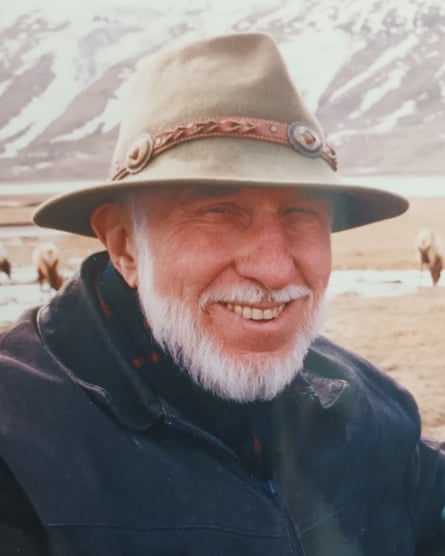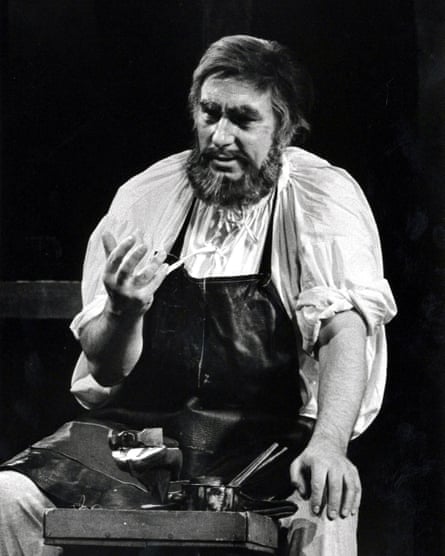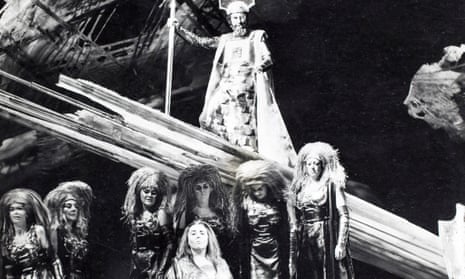The generation of British opera lovers who got to know Wagner’s works in the late 1960s and 70s was fortunate indeed that Sadler’s Wells (from 1974 English National) Opera was mounting its Ring cycle under the musical direction of Reginald Goodall. The company of singers he coached was spearheaded by Rita Hunter as Brünnhilde and Alberto Remedios as Siegmund/Siegfried, while the part of Wotan/Wanderer was taken by Norman Bailey, who has died aged 88.
These were all performances of the highest calibre, Bailey bringing to his role a remarkable vocal and dramatic authority, animated projection and exemplary enunciation. The distinctive grain of his timbre could be deployed to evoke anger, tenderness, scorn or impassioned fervour: the ability to convey suppressed or conflicted emotions was a particular feature of his delivery.
That Ring production was first seen in 1970-73, by which time Bailey’s qualities as a Wagnerian were already known from his impressive Hans Sachs in the company’s Mastersingers of Nuremberg (1968). The latter role was arguably even better suited to Bailey’s own personality, his portrayal exuding genial wisdom and humanity leavened by a touch of sly wit. Having previously sung with the Deutsche Oper am Rhein in Düsseldorf, he was in fact the only member of the cast to have performed major Wagner roles on the stage already. He had first sung Wotan in Die Walküre at Oldenburg in 1966 and Sachs at Bremerhaven in 1967. For London he had to relearn the roles in English and continued to sing them in both languages – though drew the line at having to master a new translation for a production of The Mastersingers at New York City Opera.

In total he sang no fewer than 13 Wagner roles, including most of the major bass-baritone ones – the Flying Dutchman, Amfortas and Klingsor from Parsifal, Wolfram (Tannhäuser), Kurwenal (Tristan) and Gunther (Götterdämmerung). For some, his Dutchman was insufficiently diabolic, his Klingsor inappropriately avuncular. His Gunther, both at Bayreuth and in London, however, was praised as a well-rounded study of the character’s moral failings. While even the Wotan may have been eclipsed subsequently by that of Donald McIntyre or John Tomlinson, it was a moving and highly accomplished reading that helped to secure the reputation of Goodall’s Ring as a world-class endeavour.
Bailey excelled in a wide range of other repertory too. In the early 1960s he sang at Linz and various German houses, where his Verdi roles included Rigoletto, Boccanegra, Nabucco and Renato (Un Ballo in Maschera). At ENO’s home at the Coliseum, beginning with the Count di Luna in Il Trovatore, he revisited the big Italian roles, also tackling Don Pizarro (Fidelio), Kutuzov (War and Peace), the Forester (Cunning Little Vixen) and Prince Gremin (Eugene Onegin), to all of which he brought his inimitable musical intelligence and commanding vocal and dramatic presence. The role of Barak in Die Frau Ohne Schatten, which he took for Welsh National Opera in 1981, with its emphasis on nobility of soul and human benevolence, suited him to a tee, as did Captain Balstrode in Peter Grimes. If the sadistic Baron Scarpia in Tosca (ENO, 1976) was a less obvious match, he was nonetheless able to suggest the police chief’s menace with a subtle rather than venomous vocal delivery.
His voice was sometimes described as a baritone, and although it gravitated downwards to bass-baritone for the Wagner and similar roles, he continued to take some baritone parts. In the early part of his career he took a number of roles in contemporary operas, including Dallapiccola’s Il Prigioniero, Dr Schön in Berg’s Lulu and Hindemith’s Cardillac. He created the role of Johann Matthys in Alexander Goehr’s Behold the Sun at Duisberg in 1985.
Born in Birmingham, Norman was the son of Agnes (nee Gale), who had studied singing in Italy, and Stanley Bailey, an accountant, who played a number of brass instruments. He grew up in Barnet, north London, and in wartime was evacuated to Scotland. After his family moved to South Africa, his parents went on to run two hotels in Southern Rhodesia (now Zimbabwe). He took his degree at Rhodes University, Grahamstown, Eastern Cape, studying theology before switching to music. From there he went to the Vienna State Academy.
His debut at Covent Garden in January 1969 came about unexpectedly. That day he was rehearsing the Dutchman at the Coliseum when Hubert Hofmann, singing Hans Sachs at the Royal Opera, succumbed to a throat infection. Covent Garden’s chief executive, Sir David Webster, rose that evening to tell the audience that he had telephoned round half of Europe for a suitable replacement before it was realised there was one just a few streets away.
Since Bailey had a year ago sung the part to huge acclaim at the Coliseum, having already performed it in Germany, the audience and critics could be forgiven for expressing a measure of incredulity at the announcement. Despite the lack of preparation or stage rehearsal, Bailey gave a superbly sung and acted performance, going on to sing the role at Hamburg, Brussels, Munich, La Scala, the Metropolitan and Bayreuth.

Appearing later that year as the first British Sachs at Bayreuth, little more than two decades after the end of the second world war, made for a disconcerting experience. His discomfiture was exacerbated by the discovery, immediately after the first night, of a kidney stone which had to be removed and by the penchant of the Croatian conductor Berislav Klobučar for tempi at a far remove from Goodall’s leisurely pacing. Not that Bailey was always comfortable with the latter: he was said to be immune to the spell cast by the venerated conductor and there were certainly altercations between them.
He had further misfortune at Bayreuth in 1971 when, playing the part of the grievously wounded Amfortas, he broke his own arm after the dress rehearsal, and sang the performances in considerable pain. In the intervening year, 1970, he had a happier experience appearing as both Sachs and Gunther.
Die Meistersinger always had a special place in his heart, he said, because of its role in his personal life. In 1957 he married Doreen Simpson, and they had three children, Brian, Richard and Catherine. They separated in 1980, eventually divorcing, and in 1982 he found himself singing Sachs in Cincinnati with an American soprano, Kristine Ciesinski, singing her first Eva, and a spark was ignited. After marrying in 1985, they settled in Driggs, Idaho. Ciesinski had high-profile roles at ENO (Lady Macbeth, Salome and Anna Maurrant in Kurt Weill’s Street Scene) and was a qualified pilot in the US civil defence. She died in 2018 when her glider crashed in turbulent weather over the Rockies, near Yellowstone Park.
Bailey also brought to roles such as Sachs a philosophical view of life resulting from his Bahá’í faith, according to which all religions are both interconnected and equally valid.
He is survived by his children, five grandchildren and three great-grandchildren.

Comments (…)
Sign in or create your Guardian account to join the discussion